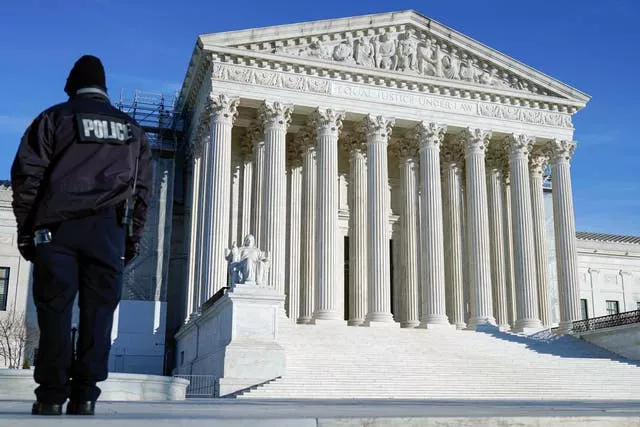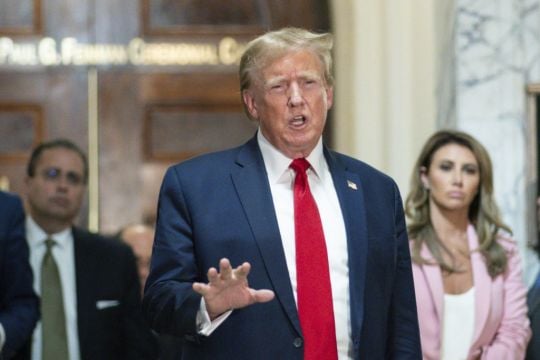The Supreme Court said on Friday it will decide whether former US president Donald Trump can be kept off the ballot because of his efforts to overturn his 2020 election loss.
The justices acknowledged the need to reach a decision quickly, as voters will soon begin casting presidential primary ballots across the country.
The court agreed to take up a case from Colorado stemming from Mr Trump’s role in the events that culminated in the January 6 2021 attack on the US Capitol.
Arguments will be held in early February.
The court will be considering for the first time the meaning and reach of a provision of the 14th Amendment barring some people who “engaged in insurrection” from holding public office.

The amendment was adopted in 1868, following the Civil War. It has been so rarely used that the nation’s highest court had no previous occasion to interpret it.
Colorado’s Supreme Court, by a 4-3 vote, ruled last month that Mr Trump should not be on the Republican primary ballot. The decision was the first time the 14th Amendment was used to bar a presidential contender from the ballot.
Mr Trump is separately appealing to state court against a ruling by Maine’s Democratic secretary of state, Shenna Bellows, that he was ineligible to appear on that state’s ballot over his role in the Capitol attack.
Both the Colorado Supreme Court and the Maine secretary of state’s rulings are on hold until the appeals are heard.
Three of the nine Supreme Court justices were appointed by Mr Trump, though they have repeatedly ruled against him in 2020 election-related lawsuits, as well as his efforts to keep documents related to January 6 and his tax returns from being turned over to congressional committees.
At the same time, Justices Amy Coney Barrett, Neil Gorsuch and Brett Kavanaugh have been in the majority of conservative-driven decisions that overturned the five-decade-old constitutional right to abortion, expanded gun rights and struck down affirmative action in college admissions.
Some Democratic lawmakers have called on another conservative justice, Clarence Thomas, to step aside from the case because of his wife’s support for Mr Trump’s effort to overturn the results of the election, which he lost to Democrat Joe Biden.
Mr Thomas is unlikely to agree. He has recused himself from only one other case related to the 2020 election, involving former law clerk John Eastman, and so far the people trying to disqualify Mr Trump haven’t asked him to recuse.
The 4-3 Colorado decision cites a ruling by Mr Gorsuch when he was a federal judge in that state. That Gorsuch decision upheld Colorado’s move to strike a naturalised citizen from the state’s presidential ballot because he was born in Guyana and did not meet the constitutional requirements to run for office.
The court found that Mr Trump likewise does not meet the qualifications due to his role in the US Capitol attack. That day, the Republican president had held a rally outside the White House and exhorted his supporters to “fight like hell” before they walked to the Capitol.

The two-sentence provision in Section 3 of the 14th Amendment states that anyone who swore an oath to uphold the constitution and then “engaged in insurrection” against it is no longer eligible for state or federal office.
After Congress passed an amnesty for most of the former confederates the measure targeted in 1872, the provision fell into disuse until dozens of suits were filed to keep Trump off the ballot this year. Only the one in Colorado was successful.
Mr Trump had asked the court to overturn the Colorado ruling without even hearing arguments.
“The Colorado Supreme Court decision would unconstitutionally disenfranchise millions of voters in Colorado and likely be used as a template to disenfranchise tens of millions of voters nationwide,” Mr Trump’s lawyers wrote.
They argue that Mr Trump should win on many grounds, including that the events of January 6 did not constitute an insurrection.
Even if it did, they wrote, Mr Trump himself had not engaged in insurrection. They also contend that the insurrection clause does not apply to the president and that Congress must act, not individual states.
Critics of the former president who sued in Colorado agreed that the justices should step in now and resolve the issue, as do many election law experts.
The issue of whether Mr Trump can be on the ballot is not the only matter related to the former president or January 6 that has reached the high court.
The justices last month declined a request from special counsel Jack Smith to swiftly take up and rule on Mr Trump’s claims that he is immune from prosecution in a case charging him with plotting to overturn the 2020 presidential election, though the issue could be back before the court soon depending on the ruling of a Washington-based appeals court.
And the court has said that it intends to hear an appeal that could upend hundreds of charges stemming from the Capitol riot, including against Trump.







